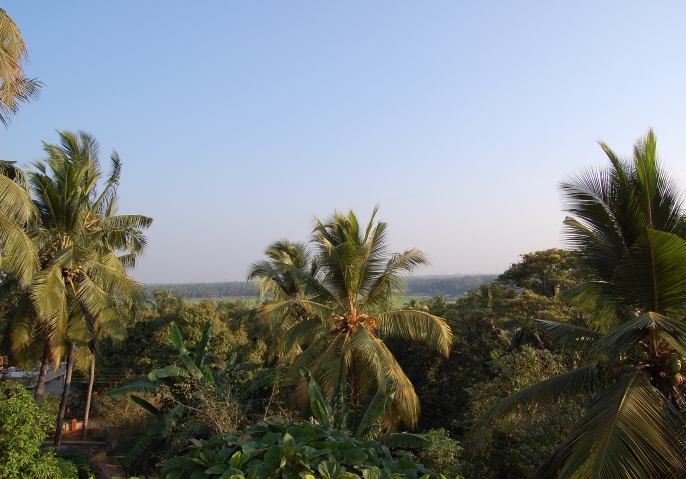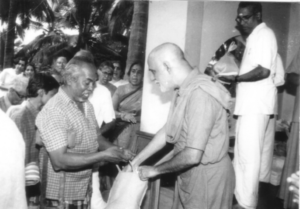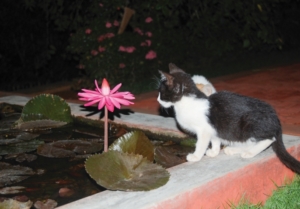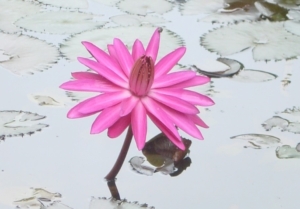Ashram Diary
Gratitude
Ma Gurupriya

A chord deep in my heart had been touched. Why did he not take money? Why did he offer his labour without anything in return? And that too with such pleasure!
I saw him through the window standing on the mound in front of my room. He was standing below a coconut tree and was looking upwards as if counting something. I heard Vinaya’s voice outside, asking him how many coconuts can be had from the lower bunch. He replied, “Eight”. I went near the window to see who that boy was.
Just then he too saw me, and his face immediately broke into a wide grin. I recognized him and smiled: “Prakasan alle? (Are you not Prakasan?) Oh, you have become so big! After so many years I am seeing you!” I went out to the verandah to see what he was up to.
I remembered him – the cute little boy who used to come to our Ashram, trailing behind his mother or sisters who would come to collect buttermilk. Those days, we had cows in the Ashram and we used to distribute extra buttermilk to the villagers every day.
Soon after breakfast we would keep on the front parapet a big vessel containing buttermilk. Many used to come carrying their vessels, asking for buttermilk. Some would come regularly. Noticing that a few were coming without bath, one day Nutan Swamiji suggested that we should try to introduce some culture in them. They were told that they should come to the Ashram only after bath, as they would go to the temple; because an ashram is also like a temple – a holy and auspicious place.
Subsequently, all started coming after bath, with fresh dress and a tilak adorning their forehead. It was apparent that they too enjoyed the change. It was particularly nice to see the little ones coming merrily with the parents or elder siblings. Prakasan was such a little one who somehow had caught my special attention. He lived in a mud cottage very near to our Ashram.
I knew very little Malayalam at that time and could speak to him only a few broken sentences with smiles and gestures. I always like children and feel purified by looking at their innocent smiles.
With time, as various activities increased in the Ashram, and also we gave away the cows, distribution of buttermilk got stopped. For some time I missed the children who used to come regularly and the elders with whom I would somehow talk to know where they lived and what they did. I think through this buttermilk session alone, I had come to know many of the villagers. Our present renunciates do not get this opportunity.
Prakasan’s visit to the Ashram stopped. But often when I went for a walk, I would meet him on the road. He would be seen either playing or taking the goats for grazing. Every time he would give a big smile in recognition.
As my walks outside the Ashram finally got stopped because of poor knee condition, I did not see him for years, till today, right in the Ashram. However, I used to hear from his sister who comes at times to share her woes, that he had grown, was working and supporting the family.
Today, he was called by our working girls to pluck some green coconuts for me. The doctor has advised me to drink green coconut water. The man who generally plucks coconuts from our trees, comes only once a month. No other worker knows to climb the coconut trees. While we were discussing what was to be done, some working girls suggested that they would call Prakasan who knew climbing. This is the history behind his arrival today.
After going out in the verandah, I asked him what he was doing presently. He said, mostly he works in sawmills as a daily wager. Although he does not get work on all days, he is quite ok.
I went inside and got involved in my work. After sometime, Vinaya came and said that Prakasan had plucked some coconuts but was refusing to tell how much money we should give him for his work. “He is wanting to see you, Ma,” Vinaya said.
I went out again. There he was standing below the verandah with the felled coconuts, obviously waiting for me to come. “How much shall we give you, Prakasan,” I asked, “it seems you did not tell them!” With a shy smile and a deep expression in his eyes, he said, “Mataji, I don’t want anything for this.”
“But Prakasan, if you do not take anything for the work you have done, how can we call you again if we need your assistance,” I asked him. He nodded his head and said, “No, I don’t want anything for this work. This I have done for your sake.”
Did the working girls tell him that the green coconuts were needed for my use – I did not know. Something was melting in my heart. He was standing a few feet away, drenched in sweat. The face was red with the heat of sun’s rays. A dense cluster of sweat drops had got formed on the forehead. But beneath the forehead the eyes were soft with fondness and with the satisfaction of service. “These coconuts will be enough for you till Sunday, I shall come again on Sunday,” he said and left.
His face, his expressions kept on haunting me. A chord deep in my heart had been touched. Why did he not take money? Why did he offer his labour without anything in return? And that too with such pleasure! Is it only because of the association of the yester years where I had poured buttermilk in the small can he carried, or may be at times I had given him plantains and biscuits from our store? Is it that he wanted to give something in return to the love and fondness that I had expressed years back when he was a little child?
I told today’s episode to Poojya Swamiji and Nutan Swamiji, and also to the other Ashramites and the working girls. Whenever I was remembering the incident, I was getting a touch of purity. The taintless feeling of gratefulness of someone who had remembered an act of fondness and affection! Should we not be like that in all our behaviour? Should we not learn from such incidents, however small, that we must grow gratefulness towards anything and everything that helps us lead this life?
A little while later, Vinaya brought a glass of coconut water to drink. It was like nectar. Immediately I remembered the “subhāshitam” I had learnt from Poojya Swamiji:
प्रथमवयसि दत्तं तोयमल्पं स्मरन्तः
शिरसि निहितभारा नारिकेला नराणाम्।
सलिलममृतकल्पं दद्युराजीवनान्तं
न हि कृतमुपकारं साधवो विस्मरन्ति॥
prathama-vayasi dattaṃ toyam-alpaṃ smarantaḥ
śirasi nihitabhārā nārikelā narāṇām।
salilam-amṛtakalpaṃ dadyurājīvanāntaṃ
na hi kṛtam-upakāraṃ sādhavo vismaranti॥
Remembering the benevolent act of men who lovingly poured a small quantity of water when it was young (sapling), the coconut tree stands throughout its life carrying on its head bunches of fruits, each containing nectarine water to be offered to the thirsty human beings. The noble people never forget the act of kindness done to them by anybody.
I remember how I was touched to the core of my heart when I heard this shloka for the first time while Poojya Swamiji chanted it and explained the meaning.
Throughout its life the coconut tree stands in sun and rain, carrying a heavy load, without the least grumbling – never saying, “I am tired”, never wanting to get rid of the load, but ever-ready to offer lovingly the fruits that contain the nectarine drink. To whom? To the mankind, who poured water on it when it was young, when the water was absolutely essential for its survival and growth. Such hearts are noble hearts.
What touched me deeply was the meaning of ‘gratitude’ expressed in this shloka – a virtue that humbles the mind, softens the heart! When ‘gratitude’ fills the mind, the mind wants to give something to others – wants to give, emptying itself, completely, entirely.
Today’s incident brought that lesson alive in my mind with a rare sublimity and inspiration.
Jai Guru.
– From Vicharasethu–2009
Whenever I was remembering the incident, I was getting a touch of purity. The taintless feeling of gratefulness of someone who had remembered an act of fondness and affection!
When ‘gratitude’ fills the mind, the mind wants to give something to others – wants to give, emptying itself, completely, entirely.
 1601 views
1601 views

 Add to Favorites
Add to Favorites Add to Reading List
Add to Reading List










